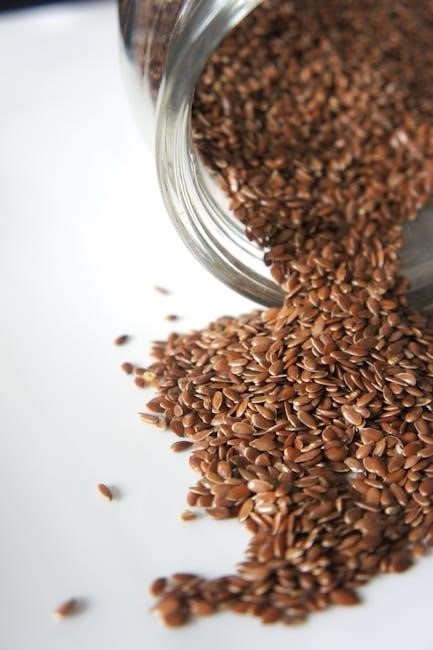Dieta Keto Gratis PDF: A Comprehensive Guide
Embark on a transformative journey with our comprehensive guide to the Dieta Keto, available in PDF format for free․ Discover the science, benefits, and practical steps to successfully implement this fat-burning lifestyle․
Understanding the Ketogenic Diet
The ketogenic diet, often shortened to “keto,” is a high-fat, very low-carbohydrate eating plan designed to shift the body’s primary fuel source from glucose to ketones․ This metabolic state, known as ketosis, occurs when carbohydrate intake is drastically reduced, typically to less than 50 grams per day․ By restricting carbohydrates, the body is forced to break down stored fat into fatty acids and ketones, which are then used as energy․
Understanding the principles of the keto diet is crucial for success․ This involves knowing which foods to prioritize, such as healthy fats and moderate protein, and which to strictly avoid, like sugary items and starchy carbohydrates․ Adhering to these guidelines allows individuals to achieve and maintain ketosis, unlocking the potential benefits of the diet․
Ketogenic Diet: The Science Behind the Fad
While often labeled a “fad diet,” the ketogenic diet is rooted in sound scientific principles․ The core concept revolves around manipulating the body’s metabolism to utilize fat as its primary energy source․ This metabolic shift occurs when carbohydrate intake is severely restricted, typically below 50 grams per day․
In the absence of readily available glucose from carbohydrates, the liver begins to break down stored fat into fatty acids, which are then converted into ketones․ These ketones, such as acetoacetate, beta-hydroxybutyrate, and acetone, become the body’s alternative fuel source․ This process, known as ketogenesis, leads to a state of ketosis․ The brain, which typically relies on glucose, can also utilize ketones for energy, making the keto diet a viable option for those seeking metabolic control․
Benefits of the Ketogenic Diet
The ketogenic diet extends beyond simple weight loss, offering a range of potential health benefits․ One of the most notable is improved blood sugar control, making it a valuable tool for managing type 2 diabetes․ By restricting carbohydrate intake, the keto diet helps stabilize blood sugar levels and reduce the need for medication․
Furthermore, the keto diet has shown promise in supporting weight management․ The increased fat intake promotes satiety, reducing cravings and overall calorie consumption․ Additionally, the metabolic shift towards fat burning can lead to significant fat loss while preserving muscle mass․ Emerging research also suggests potential benefits for neurological conditions, such as epilepsy and Alzheimer’s disease, as well as improvements in cholesterol levels and blood pressure․
Foods Allowed on the Keto Diet
Navigating the keto diet involves understanding which foods support ketosis․ Embrace healthy fats from sources like avocados, olive oil, and nuts․ Prioritize protein-rich foods, including meat, poultry, fish, and eggs․ Non-starchy vegetables are your allies, offering essential nutrients with minimal carbohydrates․ Leafy greens, broccoli, and cauliflower are excellent choices․
Dairy can be included in moderation, opting for full-fat varieties like cheese and yogurt․ When selecting nuts and seeds, consider macadamia nuts, almonds, and chia seeds․ Remember to monitor your macros to ensure you stay within your daily carbohydrate limit․ Experiment with keto-friendly recipes to discover delicious and satisfying meals․ With careful planning, you can create a diverse and enjoyable keto diet․
Foods to Avoid on Keto
Successfully navigating the ketogenic diet requires a clear understanding of foods to avoid․ The primary restriction involves high-carbohydrate items․ Grains like rice, bread, pasta, and cereal are off-limits due to their significant carbohydrate content․ Sugary foods, including candy, soda, juice, and desserts, should be strictly avoided as they can quickly derail ketosis․
Starchy vegetables such as potatoes, corn, and beans are also restricted due to their higher carbohydrate levels․ Most fruits, with the exception of small portions of berries, are generally avoided․ Processed foods often contain hidden sugars and carbohydrates, so careful label reading is essential․ Limiting alcohol consumption is advisable, as many alcoholic beverages are high in carbs․ By carefully avoiding these foods, you can maintain ketosis and optimize your keto journey․

Sample Keto Meal Plans and Recipes (PDF Downloads)
Access delicious and easy-to-follow keto meal plans and recipes! Download our free PDF resources to kickstart your ketogenic journey with expertly curated weekly menus and tasty recipes․
Sample Dieta Keto Menu Semanal PDF: A Week of Keto Meals
Are you seeking a structured approach to your keto journey? Our “Dieta Keto Menu Semanal PDF” offers a complete week of ketogenic meals, designed to simplify your meal planning․ We provide omnivorous, vegetarian, and vegan options to suit your dietary preferences, ensuring everyone can effectively follow the ketogenic diet․ This downloadable PDF includes delicious and nutritious recipes to help you achieve ketosis and support your weight loss goals․
Inside, you’ll find carefully crafted breakfast, lunch, dinner, and snack ideas, all within the guidelines of a ketogenic diet․ Each meal is designed to keep you feeling satisfied and energized throughout the day; With this guide, you’ll have the tools to enter ketosis, lose weight, and maintain a healthy lifestyle․
Keto Recipes for Breakfast, Lunch, and Dinner
Unlock a world of delicious and satisfying meals with our collection of keto recipes for breakfast, lunch, and dinner․ Embrace the ketogenic lifestyle with flavorful options that fit perfectly within your macros․ Start your day with keto-friendly pancakes or a savory egg and avocado scramble․ For lunch, enjoy a refreshing salad loaded with healthy fats and protein, or a hearty soup․
Dinner becomes an exciting adventure with options like steak with cauliflower mash, salmon with asparagus, or chicken with creamy spinach․ These recipes are designed to keep you in ketosis while providing essential nutrients․ Download our free PDF for a complete guide to creating mouthwatering keto meals every day․ Transform your diet with these simple, satisfying, and delicious recipes․
Vegan Keto Recipes
Discover the exciting world of vegan keto with our specially curated collection of plant-based recipes․ This section provides delicious and nutritious options for breakfast, lunch, and dinner that align with both vegan and ketogenic principles․ Enjoy creamy avocado smoothies, tofu scrambles with nutrient-rich vegetables, and satisfying coconut-based curries․
Explore innovative ways to incorporate healthy fats and plant-based proteins into your diet, ensuring you stay in ketosis while enjoying a variety of flavors․ Download our free PDF for a complete guide to vegan keto recipes, featuring detailed instructions and nutritional information․ Embrace a compassionate and health-conscious lifestyle with these easy-to-prepare and delicious vegan keto meals․

Tips for Keto Success
Maximize your keto journey with our expert tips․ Learn how to overcome challenges, stay consistent, and optimize your results for long-term success on the ketogenic diet․
Beyond the Menu: Tips for Keto Success
Succeeding on the keto diet extends further than just following a meal plan; Prioritize sleep, managing stress, and incorporating regular physical activity to enhance your keto experience․ These lifestyle factors can significantly impact your progress and overall well-being․
Consider intermittent fasting as a complementary strategy to boost ketone production and fat loss․ Experiment with different fasting windows to find what suits your body best․ Stay consistent with tracking your macros and ketone levels, using tools like ketone strips or a blood ketone meter․ This data provides valuable insights into your body’s response to the diet, allowing you to make informed adjustments․ Don’t be afraid to adapt your approach based on your individual needs and preferences․
Remember, keto is a personalized journey, and what works for one person may not work for another․ Listen to your body, be patient, and celebrate small victories along the way․
Hydration and Electrolyte Balance
Maintaining proper hydration and electrolyte balance is crucial for keto success․ As your body adapts to using fat for fuel, it excretes more water and electrolytes․ This can lead to dehydration and electrolyte imbalances, causing symptoms like fatigue, headaches, and muscle cramps, often referred to as the “keto flu․”
To combat these effects, prioritize drinking plenty of water throughout the day․ Aim for at least eight glasses of water, and consider adding electrolytes to your water or consuming electrolyte-rich foods like leafy greens and avocados․ Supplementing with sodium, potassium, and magnesium can also help replenish lost electrolytes․
Listen to your body’s signals and adjust your hydration and electrolyte intake accordingly․ Monitoring your symptoms and making necessary adjustments will ensure you feel your best on keto․ Proper hydration and electrolyte balance are vital for optimal energy levels, muscle function, and overall well-being․
Monitoring Ketosis
Ensuring you’re actually in ketosis is key to reaping the benefits of the keto diet․ Monitoring your ketone levels provides valuable feedback on whether your diet is effectively shifting your body into fat-burning mode․ Several methods can be used to track ketosis, each with its own advantages and disadvantages․
Urine ketone strips are a convenient and affordable option for beginners, although they can be less accurate over time․ Blood ketone meters offer the most precise measurements but require a small blood sample and can be more expensive․ Breath ketone analyzers are another option, providing a non-invasive way to estimate ketone levels․
Experiment with different monitoring methods to find what works best for you․ Regular monitoring allows you to fine-tune your diet and lifestyle to optimize ketone production and achieve your desired results․ Pay attention to how you feel and adjust your approach as needed․

Potential Risks and Considerations
Before starting the keto diet, it’s crucial to acknowledge potential risks․ While effective for some, keto isn’t suitable for everyone, and certain health conditions warrant extra caution and professional guidance․
Potential Risks Associated with the Keto Diet
The ketogenic diet, while effective for some, presents potential risks that individuals must consider․ Initially, “keto flu,” characterized by fatigue, headache, and nausea, can occur as the body adapts to using fat for fuel․ Long-term concerns include nutrient deficiencies if the diet isn’t carefully planned, as restricting certain food groups can limit vitamin and mineral intake․
Kidney stones are another potential complication due to increased uric acid excretion․ Constipation is also common because of low fiber intake․ Furthermore, individuals with pre-existing liver or pancreatic issues should exercise caution, as the high-fat content can exacerbate these conditions․ Consulting a healthcare professional before starting keto is vital to assess individual suitability and mitigate potential health risks․ Finally, electrolyte imbalances might happen․
When to Consult a Healthcare Professional
Before embarking on the ketogenic diet, seeking guidance from a healthcare professional is crucial, particularly for individuals with pre-existing health conditions․ Those with diabetes should consult their doctor, as keto can significantly impact blood sugar levels and medication adjustments may be necessary․ Individuals with kidney or liver issues also require medical supervision due to the diet’s potential strain on these organs․
If you experience persistent or severe side effects like fatigue, nausea, or dizziness while on keto, promptly consult a doctor․ Pregnant or breastfeeding women should avoid keto unless specifically advised by their healthcare provider․ Furthermore, anyone with a history of eating disorders should seek professional guidance to ensure the diet is implemented safely and doesn’t trigger unhealthy behaviors․ Regular monitoring and communication with a healthcare team are essential for a safe and effective keto journey․

Resources and Further Learning
Expand your keto knowledge with our curated list of free PDF resources․ Delve into detailed guides, recipe books, and scientific studies to master the ketogenic diet and achieve your health goals․
Free Keto Resources in PDF Format
Unlock a treasure trove of valuable information with our collection of free Keto resources in PDF format․ These downloadable guides offer comprehensive insights into various aspects of the ketogenic lifestyle, including meal planning, recipes, and troubleshooting tips․ Whether you’re a beginner or an experienced keto enthusiast, these resources will empower you with the knowledge you need to succeed․
Explore detailed meal plans designed to simplify your dietary transition, discover delicious and easy-to-follow recipes that cater to different tastes, and gain a deeper understanding of the science behind ketosis․ From shopping lists to guides on managing electrolytes, these PDFs are your go-to companions for navigating the keto journey․ Access them anytime, anywhere, and embark on a path to better health and well-being․
